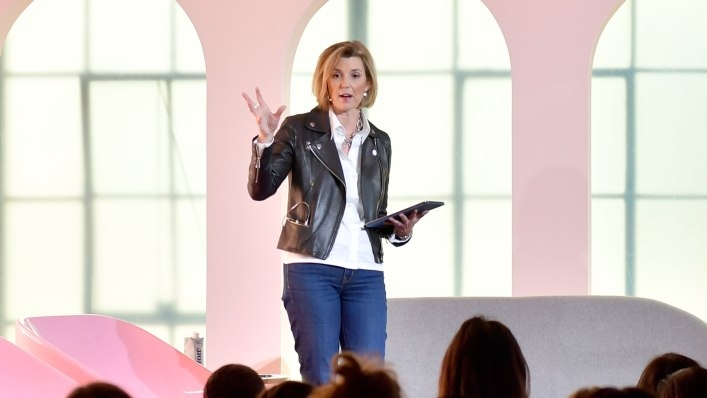Is Sallie Krawcheck’s Women-Centric Investment Firm, Ellevest, Another Example Of The “Pink Tax”?
There is no pink on display in the offices of Ellevest, an investment service designed for women. Instead, there is a turquoise rug at the entrance, a set of tufted window cushions in sea foam green, and a gold-painted message wall reminding visitors that here, “Details matter.” Other startups have beer on tap; Ellevest provides employees with a wine fridge. The atmosphere is unabashedly feminine, yes. But no pink.
Ellevest’s deliberate choice of aesthetic, which carries over into the company website, sends a signal to prospective customers: This is an investment service created by and for real women. Invest for retirement and other financial goals through Ellevest, and your questions (and love of throw pillows) will be welcome. Each piece of the product has been informed by research on women’s attitudes toward money, which revealed widespread frustration with the condescension rampant at existing investment firms. For example, many traditional advisors expect clients to determine their own risk profile, something that a first-time investor may not have the knowledge to do.
“Son of a gun, the industry today has built a pink wall that I don’t think they meant to build, but that has kept women out,” says cofounder and CEO Sallie Krawcheck, a finance veteran who previously led the wealth management divisions of Citigroup and Bank of America. Born in New Orleans*, she speaks with Wall Street flair, modulated by Southern manners. Krawcheck knows the industry’s shortcomings with regard to serving women, and she is determined to correct them. “Money is power,” she says, her hand clad in diamond rings that illustrate the point.

Krawcheck has built a female-friendly financial brand that she herself embodies. But to take advantage of Ellevest’s services, women have to pay what is arguably a “pink tax,” as they do for products like razors and dry cleaning. Ellevest charges a management fee of 50 basis points, or 0.5%; robo-advisors Betterment and Wealthfront, in contrast, charge 25 basis points for comparable products. Some robos, like Charles Schwab Intelligent Portfolios and WiseBanyan, are even more accessible to first-time investors, giving away basic versions of their software for free.
“It adds up to a considerable amount of money over the long-term,” Arielle O’Shea, the investing and retirement specialist for NerdWallet, says of the differences in price. “Expenses that you pay compound, just like your returns compound. The longer you have to invest, even if the expense seems low, it’s going to end up costing you.”
As for Ellevest: “They’re certainly charging a premium, and whether the premium is worth it is going to depend on your needs.”
On Ellevest’s website, it can be hard to gauge just how expensive the offering will be, versus that of a competitor. The company’s pricing page glosses over the fine print and calculates only the annual cost for a given asset-input, rather than the all-in cost that a woman will pay Ellevest over the course of her lifetime as a customer. A second, more in-depth pricing page again emphasizes cost per annum, rather than the difference in cost over time. But across 20 years or more, $125 in extra fees becomes tens of thousands of dollars.
Krawcheck says she originally envisioned Ellevest as a bare-bones robo-advisor, with bargain basement fees. “And then I realized, as we began the research—if low-cost was going to attract her, it would have attracted her. What’s she’s looking for is value.”
Within the product, value first and foremost takes the form of software and risk management designed with women’s career trajectories in mind. Women tend to take more career breaks than men, and their salaries typically peak earlier. On average, they also live several years longer than men. As a result, Krawcheck says, it’s critical that women save a higher percentage of their income, and that investment services take women’s distinct career patterns into account. Her team’s simulations suggest that Ellevest customers will benefit from the company’s more accurate assumptions (and the customers’ own higher savings rates) in the long run. If Ellevest works as promised, the service could help close the yawning retirement gap between men and women, which is even more stark than the wage gap.

“If you have a fundamental belief that all investment management is the same, then it’s all about price,” she says. “If you believe, as we do, that by using technology, being thoughtful about this, you can provide a higher probability of reaching their goals—that’s the trade-off.”
Ellevest also shines when it comes to more subjective intangibles, which help reduce the intimidation factor associated with money management. The on-boarding process, for example, is friendly and conversational, turning what could be form-filler drudgery into an opportunity to plan and reflect. Some sites put their customers through the equivalent of middle school algebra in order to set goals—for mortgage downpayment X, save Y per month—but Ellevest pushes all those mechanics to the background. After establishing goals, “Elle” can use an interactive planning tool to tweak variables like retirement age. It’s all very pleasant, far more pleasant than most financial websites. But it costs a pretty penny.
Robo-advisors as a whole got their start as low-cost alternatives to human financial advisors. Traditional advisors typically charge management fees in the neighborhood of 1.5%, or triple Ellevest’s rate, and cater to high-net-worth clients. Early robo founders saw an opportunity to reach the underserved mass-affluent by using technology to automate human expertise. Their timing was fortuitous, with passive investing on the rise and employer-sponsored retirement benefits simultaneously in decline. Betterment, the largest of the robo-advisor startups, recently surpassed $10 billion in assets under management.
Some robo-advisors now offer “hybrid” products that include human advice, and charge correspondingly higher fees. But as they drift into higher asset tiers, others continue to target early-career clients, charging little to nothing for their core service. Wise Banyan cofounder and co-CEO Vicki Zhou, for example, advocates a freemium approach. “It’s always worthwhile to go to someone who gives you everything you need for the lowest cost possible,” she says.
In Zhou’s view, existing fee structures make it challenging for consumers to understand value. “Am I getting twice the value at 50 basis versus 25? I feel like usually when I look at the different offerings, there isn’t something linear or logical like that.” A la carte services like Wise Banyan, she says, provide greater transparency by tying fees to specific benefits.
But Krawcheck isn’t buying it. “The real competitor for us is inertia. Because of this pink wall. It isn’t that everybody runs to the robo-advisors that are now zero and 15 basis points and 25 basis points.” She adds: “P.S., those aren’t sustainable business models.”
She leaves unsaid that Ellevest, with its higher fees and more modest venture capital support, does not need to become the next Fidelity (which has over $2.1 trillion in assets under management) in order to break even. For Betterment, Wealthfront, et al, which have raised tens of millions in venture capital, the asset bar is higher, and the economics are higher-stakes.
But asset growth? That’s in the future. For now, customer acquisition is the primary focus for Ellevest and every one of its competitors.
“The firms who get it right, and understand women in particular, know that we don’t want pink with a bow around it,” says personal finance expert Lynnette Khalfani-Cox. “It’s really about an approach that’s collaborative, that’s communicative, and that understands that women often want to ask questions.”
When they do, Krawcheck and her team will be ready to answer.
*An earlier version of this story said that Krawcheck was born in Charleston, S.C. She was born in New Orleans, but grew up in Charleston.
Fast Company , Read Full Story
(58)














